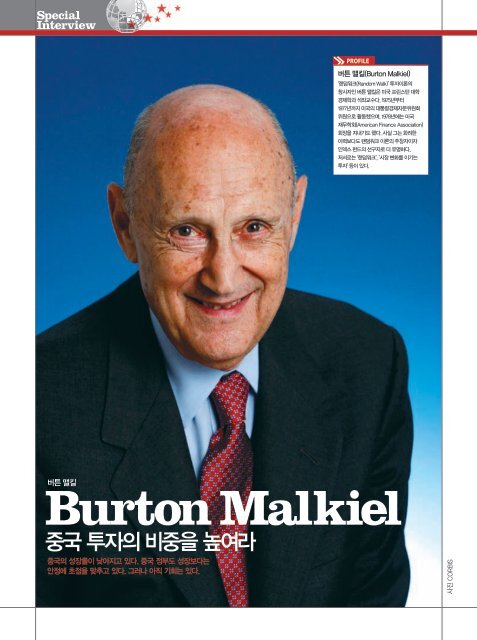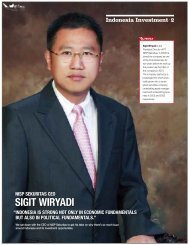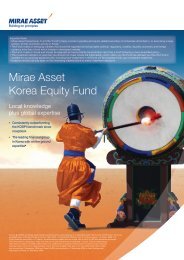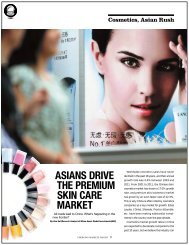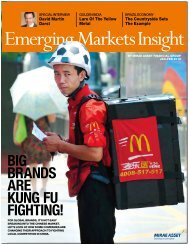Burton Malkiel - Mirae Asset Financial Group
Burton Malkiel - Mirae Asset Financial Group
Burton Malkiel - Mirae Asset Financial Group
Create successful ePaper yourself
Turn your PDF publications into a flip-book with our unique Google optimized e-Paper software.
Special<br />
Interview<br />
Profile<br />
버튼 맬킬(<strong>Burton</strong> <strong>Malkiel</strong>)<br />
‘랜덤워크(Random Walk)’ 투자이론의<br />
창시자인 버튼 맬킬은 미국 프린스턴 대학<br />
경제학과 석좌교수다. 1975년부터<br />
1977년까지 미국의 대통령경제자문위원회<br />
위원으로 활동했으며, 1978년에는 미국<br />
재무학회(American Finance Association)<br />
회장을 지내기도 했다. 사실 그는 화려한<br />
이력보다도 랜덤워크 이론의 주창자이자<br />
인덱스 펀드의 선구자로 더 유명하다.<br />
저서로는 ‘랜덤워크’, ‘시장 변화를 이기는<br />
투자’ 등이 있다.<br />
버튼 맬킬<br />
<strong>Burton</strong> <strong>Malkiel</strong><br />
중국 투자의 비중을 높여라<br />
중국의 성장률이 낮아지고 있다. 중국 정부도 성장보다는<br />
안정에 초점을 맞추고 있다. 그러나 아직 기회는 있다.<br />
사진 Corbis
The financial crisis in 2008 struck China<br />
hard. I figure your faith in China also might<br />
have had dwindled a bit<br />
No, I have never lost my faith in China. The<br />
financial crisis in 2008 certainly was a disaster and the<br />
world seemed like it was coming to the end. And China<br />
wasn’t the exception here. Although China has reached<br />
above 10% growth most of the years, it indeed slowed<br />
down in 2008 and 2009. But slowed down to what To 7 to<br />
8%! And that’s higher than most of the countries before the<br />
crisis. The exchange rate is another reason why I strongly<br />
believed in China. Chinese Yuan, I still believe, is one of the<br />
most undervalued currencies in the world. So, for the<br />
person who lives in a developed country, investment in<br />
China provides a great opportunity here. Investment in<br />
China is one of the few things I always have strong faith in.<br />
<strong>Burton</strong> <strong>Malkiel</strong><br />
••<br />
“지금까지 중국 투자에<br />
대한 믿음이 흔들렸던<br />
적은 단 한 차례도 없다.<br />
중국 투자는 내가 가지고<br />
있는 몇 안 되는 확고한<br />
신념 중 하나다.”<br />
금융위기 이전 중국은 확실히 성장할 수밖에 없는 신<br />
흥국의 대표 주자였다. 10여 년간 10% 이상의 경제성<br />
장률을 보이며 ‘폭주하는 기관차’라는 별칭이 붙을 정<br />
도였다. 이런 중국이 변하고 있다. 이번 위기로 ‘수출 중심 성장’<br />
의 위험성을 절감한 중국이 내수 시장, 인프라, 복지 등 ‘내수<br />
중심 성장’으로 체질을 개선 중이다. 전문가들은 이로 인해 향<br />
후 경제성장율이 소폭 낮아질 것이라고 하지만 한 가지 단서<br />
를 달고 있다. 중국 경제의 상승세가 꺾이지는 않을 것이라는<br />
점이다. 또 어떤 전문가는 중국 지도부가 8% 성장을 예상하고<br />
있지만 실질적으로는 10%에 가까운 성장을 할 것으로 예측했<br />
는데, 지금까지 중국 지도부는 높은 목표치를 세우기보다는<br />
낮은 목표치를 설정하고 이를 초과 달성해왔기 때문이라는 설<br />
명이다. 분명 대부분의 전문가들은 향후 10년 이상 중국의 성<br />
장세가 지속될 것이고 중국에 투자해야 한다고 강조하고 있<br />
다. 그중에서도 가장 대표적인 인물은 세계 금융의 구루<br />
(Guru)로 꼽히는 버튼 맬킬이다. 그는 미국 프린스턴 대학 경<br />
제학과 석좌교수로 대통령경제자문위원회 위원으로 활동했<br />
고, 뱅가드 투자 그룹과 프루덴셜 금융회사 등 주요 기업의 이<br />
사회에 참여하고 있다. 사실 그를 설명한다면 1970년대 집필<br />
한 ‘랜덤워크이론’(A Random Walk Down Wall Street) 하<br />
나만으로도 충분하다. 이 책은 지금도 월가의 금융 전문가들<br />
이 필독해야 하는 투자 지침서로 손꼽힌다. 그가 2007년 집필<br />
한 저서 ‘중국을 말하다’ (원제: From Wall Street to<br />
the Great Wall)가 우리나라에서는 3월에 발간됐<br />
다. 이 책은 4년 전, 그것도 금융위기 이전에 쓰<br />
였음에도 현재의 금융 상황을 설명하는 데 여<br />
전히 유용하다고 느껴질 정도로 그의 중국<br />
에 대한 분석은 완벽하다.<br />
그는 ‘이머징 인베스터’와 한 서면 인터뷰에<br />
서 “중국 투자는 내가 가지고 있는 몇 안 되<br />
는 확고한 신념 중 하나”라고 말할 정도로 중<br />
국의 성장세에 대한 확신을 피력했다. 예리한 통<br />
찰력과 분석력을 갖춘 그가 말하는 중국의 숨겨진<br />
매력은 무엇인지 들었다.<br />
2008년 미국발 금융위기로 중국은 큰 타격을 받았다. 중국 투자에<br />
대한 믿음이 흔들렸을 법도 한데.<br />
그렇지 않다. 지금까지 중국 투자에 대한 믿음이 흔들렸던 적은<br />
단 한 차례도 없다. 금융위기가 재앙에 가까울 정도로 전 세계<br />
경제에 심각한 타격을 준 것은 사실이다. 중국도 예외는 아니<br />
다. 최근 몇 년 동안 10%에 육박하던 중국의 경제성장률이 금융<br />
위기 여파로 하락했다. 그런데 하락했다는 게 7~8% 선까지다.<br />
이는 대부분 국가가 위기 발생 이전에도 감히 넘보지 못하던 수<br />
준이다. 중국에 대한 믿음이 흔들리지 않는 또 다른 이유는 환
Special<br />
Interview<br />
The inflation in emerging markets is becoming a serious<br />
issue globally. As your faith is again tested, do you believe<br />
China is able to overcome the hardship What are your<br />
reasons<br />
Yes, with the increases in the price of food and fuel,<br />
inflation in emerging markets is becoming a serious issue.<br />
The problem is in that raising the interest rate to lower the<br />
inflation would only end up prolonging the recession. I<br />
don’t think the Chinese government will directly do<br />
something about the inflation because they need to<br />
maintain the current growth level in order to create<br />
jobs. So if we have successful crop years during<br />
2011, and if the crisis abates in the Middle<br />
East, I anticipate that inflation will<br />
moderate and that the world economy,<br />
including China, will be able to overcome<br />
this hardship.<br />
While most professional investors are<br />
very fond of China, it is still a country with<br />
one of the highest volatility in the eyes of<br />
general investors. What makes China so<br />
unique that one should invest in the country in<br />
spite of the volatility<br />
I want to make a correction here. I’m not saying the<br />
investors should all-in on China, but rather suggesting that<br />
they should allocate more to China the weight it deserves.<br />
China’s uniqueness derives from its unique financial<br />
structure. It turns out that because of the peculiarities in the<br />
structure, the weight of China in the global funds is lower<br />
than it should be. The Chinese market is subdivided into<br />
markets with different alphabet labels such as A shares, H<br />
shares and so forth. A shares are the shares only allows for<br />
Chinese locals to invest, and most of the shares in China are<br />
actually the A shares. Now, this part—the part that locals<br />
invest—is not included in the index because they are not<br />
widely available. Most indices use what is called the “floatweighted”<br />
ratio to decide how much proportion each<br />
country should take. The float-weighted only includes the<br />
capitalization that’s freely traded, which means the amount<br />
of shares traded among the locals and held by the<br />
government are excluded. Giving more weight to China<br />
will provide the individual investors with better asset<br />
allocation strategy.<br />
In your book, ‘From Wall Street to the Great Wall’, you<br />
spoke highly of Confucianism, while pointing out ‘culture’<br />
as the most important factor in achieving economic<br />
“농작물 생산이 증가하고<br />
중동 사태가 해결되면<br />
물가상승률이 완화하면서<br />
세계경제는 곤경에서<br />
벗어날 것이다.”<br />
율이다. 중국 위안화는 전 세계에서 가장 저평가된 통화에 속<br />
한다. 이는 다시 말해 선진국 투자자에게 중국은 엄청난 투자<br />
기회를 제공한다는 의미로 해석할 수 있다. 그러므로 중국 투<br />
자는 내가 가지고 있는 몇 안 되는 확고한 신념 중 하나다.<br />
전 세계가 이머징 마켓의 인플레이션을 주시하고 있다. 중국에 대<br />
한 그 믿음이 다시 시험대에 오른 듯한데. 이번에도 잘 이겨낼 것이<br />
라 믿는가 또 그 근거가 있다면<br />
식량 가격 및 유가 상승이 계속되는 상황에서 이머징 국가의 인<br />
FURTHER READING<br />
플레가 심각한 문제로 대두되고 있다. 물가 상승을 잡기<br />
위해 고금리 정책을 펼친다면 경기 침체에서 벗어나<br />
기 어려울 것이라는 데 문제의 심각성이 있다. 일<br />
자리 창출을 위해 현재의 경제성장률을 유지<br />
해야 하기 때문에 중국 정부가 직접적 개입을<br />
통해 인플레를 억제하려고 나서지는 않을 것<br />
이다. 올해 농작물 생산이 증가하고 중동 사<br />
태가 해결되면 물가상승률이 완화되면서 중<br />
국을 포함한 세계경제가 이 곤경에서 벗어날<br />
수 있을 것이라고 기대한다.<br />
중국은 일반 투자자가 보기엔 변동성이 심한 나라인데도 투<br />
중국을 말하다<br />
(From Wall Street to the Great Wall)<br />
불과 반세기 전만 해도 중국은 사유<br />
재산제도를 폐지했고, 정책도 기업에<br />
가장 적대적인 나라였지만 지금은 일<br />
본을 제치고 세계 2위 경제 대국으로<br />
급성장했다. 그럼에도 중국은 아직까<br />
지 충분히 투자 가치가 있는 나라다.<br />
그러나 많은 투자자가 말도 많고 탈<br />
도 많은 중국 투자에 대해 고민하고<br />
있다. 경제는 성장하지만 투자 기회는<br />
많지 않기 때문이다. 중국 투자에 관<br />
심이 있는 투자자를 위한 책이 출간됐다. 바로 ‘중국을 말하다’다.<br />
이 책은 새로운 중국에 관한 놀라운 이야기와 유례없는 성장 전<br />
망을 전한다. 단, 성급하게 경제만 언급하는 것이 아니라 중국의<br />
역사, 문화 전반에 대한 이야기부터 시작한다. 중국 주식시장을<br />
알기에 앞서 자본주의와 사회주의가 공존하는, 독특한 ‘중국’이라<br />
는 나라 자체에 대한 이해가 있어야 하기 때문이다. 그러고 나서<br />
본격적인 투자 전략이 펼쳐진다.<br />
1부에서는 중국의 과거와 현재를 보여주고, 2부에서는 중국 거주<br />
자 혹은 중국 비거주자가 잡을 수 있는 각각의 투자 기회를 살펴<br />
본다. 마지막으로 3부에서는 중국의 경제 호황 속에서 이익을 얻<br />
는 전략을 제시했다. 분명 중국 경제는 지금도 미래를 향해 전진<br />
하고 있다. 이 거대 시장에서 숨어 있는 기회를 발견하려는 투자<br />
자라면 이 책은 매우 귀중한 자원이 될 것이다.
growth. Why is culture crucial What aspects of<br />
Confucianism attribute to economic growth<br />
The aspect of Confucianism that I think is critically<br />
important is the reverence for education. We now live in the<br />
era of information, not the industrialization age. This means<br />
the role of human capital is, in my personal view, somewhat<br />
more important than that of physical capital. China and<br />
most other countries under Confucian influence show low<br />
illiteracy ratings and high quality labor force.<br />
Another point I want to make is the high savings rate.<br />
Although consumption can be virtue in times of recessions,<br />
but for emerging markets, the availability of money is an<br />
important element for economic growth. Many developing<br />
countries are limited their growth due to lack of liquidity.<br />
The conservative consumption behavior and healthy<br />
savings rate are two major attributes of Confucianism to<br />
economic growth of China.<br />
In contrast, Confucianism is viewed as a stumbling block<br />
to establishment of democracy in China, and therefore,<br />
to economic growth.<br />
Yes, that is very much correct. Confucianism, as far as I<br />
understand, is very much patriarchal by its belief. A small<br />
group of elites controls the country, and this seems to be<br />
<strong>Burton</strong> <strong>Malkiel</strong><br />
자 전문가들은 중국 투자를 외치고 있다. 중국 투자의 매력은 무엇<br />
이라 생각하는가<br />
한 가지 분명히 해두고 싶은데, 투자자가 중국에 올인해야 한<br />
다고 생각하지는 않는다. 단지 중국 투자에 좀 더 큰 비중을<br />
둘 만한 가치가 있다는 얘기다. 중국에는 독특한 금융 구조가<br />
형성되어 있다. 이러한 중국만의 구조적 특이성 때문에 글로벌<br />
펀드에서 중국 투자가 차지하는 비중이 크지 않다. 중국 주식<br />
은 A주, H주 등 편의상 종목 앞에 알파벳을 붙여 분류한다. A<br />
주식은 내국인 투자 전용으로 중국 주식의 대부분을 차지하지<br />
만 널리 유통되지 않기 때문에 글로벌 지수에 편입되지 않는<br />
다. 대부분 글로벌 지수가 채택하고 있는 ‘유동주식가중비율’<br />
(float-weighted ratio)은 각국을 대표하는 주가지수의 편입<br />
비중을 결정한다. 즉 자국에서만 거래되거나 정부 소유 주식<br />
등 비유통주를 제외한, 실제로 유통되는 주식만을 편입한다<br />
는 말이다. 보다 효율적인 자산 배분을 위해 투자자들은 중국<br />
투자의 비중을 높일 필요가 있다.<br />
저서 ‘중국을 말하다’에서 경제성장에 가장 중요한 요인으로 ‘문화’<br />
를 꼽으면서 동양의 유교 문화를 높게 평가했다. 문화는 왜 중요하<br />
며, 유교의 어떤 점이 경제성장에 도움이 된다고 보는가<br />
유교 사상은 교육을 강조한다. 현재 우리는 산업화 시대가 아
Special<br />
Interview<br />
<strong>Burton</strong> <strong>Malkiel</strong><br />
easily accepted by the people of China. What make the<br />
democracy difficult are not the war weapons but the culture<br />
that is obedient to the current power.<br />
In addition to democracy issue, China needs to solve one<br />
more task of the “crony capitalism”, where businesses<br />
depend on the government for growth. But I believe as<br />
the economy grows more and more mature, the<br />
country will eventually grow out of the above<br />
mentioned problems.<br />
China’s economy has grown quantitatively<br />
and qualitatively compared to<br />
that of 2007 when this book was first<br />
published. It is natural for the global<br />
society to focus on the possibility of<br />
Yuan (RMB) becoming a key currency as<br />
well as the establishment of ‘Asian Union.’<br />
What are your thoughts on the issues<br />
I really think that not soon but some day Yuan will<br />
become a key currency globally. Yuan (RMB) will<br />
continue to appreciate against the dollar and other major<br />
currencies in the world, and as it is already so in Asia, it<br />
will gradually gain its influence in international trade.<br />
However, for Yuan to attain that role, it is inevitable for<br />
China to free up its controls over foreign exchange policy<br />
because without it there can’t be any derivatives created to<br />
hedge the risks. This certainly decreases the total utility of<br />
“개인 투자자는 보수 비용이<br />
적은 ETF가 더 유용할 수<br />
있다. ETF를 통해 개인 투자자는<br />
자신의 포트폴리오에<br />
중국 비중을<br />
높일 필요가 있다. ”<br />
닌 정보화 시대에 살고 있다. 개인적인 생각이지만 그만큼 물<br />
적 자본보다 인적 자본의 역할이 중요하다. 중국을 포함한 많<br />
은 유교 국가는 문맹률이 낮고 뛰어난 인재도 많이 배출하고<br />
있다. 유교가 경제성장에 기여하는 또 다른 요소는 저축률이<br />
다. 경기침체 시에는 소비가 미덕으로 여겨질 수 있지만, 이머<br />
징 국가는 경제성장을 위해 유동성을 확보하는 것도<br />
중요하다. 많은 개발도상국이 유동성 부족으로<br />
어려움을 겪고 있다는 측면에서 볼 때 중국<br />
은 소비를 줄이고 저축을 많이 하도록 가르<br />
치는 유교사상 덕택에 높은 경제성장을<br />
이룰 수 있었다고 볼 수 있다.<br />
오히려 유교적인 문화가 중국 민주화를 늦추<br />
고 있다는 주장도 있다.<br />
사실이다. 유교에는 가부장적인 사상이 뿌리<br />
깊게 박혀 있다고 생각한다. 중국인들은 소수의<br />
엘리트 집단이 국가를 통솔하는 정치 형태를 별다른 거<br />
부감 없이 받아들이는 것처럼 보인다. 그러므로 민주화를 늦추<br />
는 것은 압제가 아니라 현재 정치 권력에 순응하도록 가르치는<br />
유교 문화라고 본다. 이와 더불어 중국에 만연해 있는 ‘정실 자<br />
본주의’도 해결해야 할 과제다. 정실 자본주의는 기업이 정부<br />
에 의존해 성장하는 자본주의를 말한다. 하지만 경제가 점점<br />
성숙할수록 앞서 언급한 문제들도 점차 해결될 것이라 믿어<br />
의심치 않는다.
the currency. They would eventually let go of the control,<br />
but it will take quite a long time, considering that the<br />
change in the rate would cause a shock to the economy.<br />
And when Yuan attains this position, Asian Union<br />
wouldn’t be just a dream.<br />
You are well known as the big proponent of the index fund<br />
among Korean investors. But in the book you said Chinese<br />
stock market is still inefficient, and that is interesting.<br />
What is the ground for your argument<br />
My research suggests that the A-share markets in China are<br />
inefficient, and you can look this up in my book if you<br />
would like. The reason is that they are not open freely to<br />
world international investors. However, my research<br />
suggests that the H- and N-share markets are reasonably<br />
efficient, and it is more difficult for the active managers to<br />
beat the various indices. Since these markets are reasonably<br />
efficient, I think the low cost ETFs work well, and<br />
individual investors should have a larger share of their<br />
assets invested in China.<br />
China still seems too risky for individual investors who<br />
had experienced big loss during the financial crisis. If you<br />
would suggest a mid to long-term asset allocation<br />
strategy for them<br />
Surely, this has not been a great 10 years to invest in stock<br />
market. That why diversifying the portfolio<br />
has become so important. You should<br />
always have bonds as well as stocks.<br />
Bonds did very well during the last<br />
decades. Also you want to be diversified<br />
internationally. I would suggest having<br />
more emerging markets in your<br />
portfolio rather than to invest in<br />
other expensive commodities.<br />
By investing in emerging<br />
market countries that are<br />
rich in natural resources the<br />
investor should gain the<br />
same effect he would<br />
when investing in<br />
commodities.<br />
Also overweight on<br />
China. It is the fastest<br />
growing country in<br />
the world, and you<br />
don’t want to miss<br />
out on that.<br />
이 책이 쓰여진 2007년보다 중국의 경제 규모가 훨씬 커진 것 같다.<br />
자연히 기축통화로서 위안화와 ‘아시아 연합’ 구축에 대한 논의가<br />
나오고 있는데. 현실적으로 가능성이 있는 얘기인가<br />
지금 당장은 아니지만 언젠가는 위안화가 세계 기축통화로서<br />
부상할 것이라고 본다. 달러 및 다른 통화 대비 위안화 평가 절<br />
상은 계속 이루어질 것이다. 이미 아시아에서 위안화가 무역 결<br />
제 자금으로 사용되고 있고, 이는 점차 세계무역으로 확대될<br />
것이다. 하지만 위안화가 기축통화의 지위를 얻기 위해서는 외<br />
환 자유화가 선행되어야 한다. 왜냐하면 위안화를 무역 결제<br />
자금으로 받았다 하더라도 고정환율제하에서는 위안화 환리<br />
스크를 헤지할 수 있는 금융 상품을 만들어 낼 수 없기 때문이<br />
다. 이런 부분은 확실히 화폐의 유용도를 떨어뜨리게 마련이어<br />
서 위안화가 기축통화로 성장하기 위해 중국 정부는 언젠가<br />
통제의 끈을 놓아야 한다. 하지만 중국 경제에 가져올 충격을<br />
고려했을 때, 외환 자유화가 이루어지기까지 상당한 시간이 걸<br />
릴 것으로 보인다. 위안화가 기축통화로서 입지를 다진다면<br />
‘아시아 연합’을 구축하는 일은 더 이상 요원한 꿈만은 아니다.<br />
인덱스 펀드의 선구자로 한국에도 잘 알려져 있는 분이 중국 증시가<br />
아직 비효율적이라고 주장했다는 점이 흥미롭다. 근거는 무엇인가<br />
내 책에 제시한 연구 결과와 같이 A증시는 비효율적인데, 그<br />
이유는 A증시가 해외 투자자들의 투자를 제한적으로 허용하<br />
기 때문이다. 이와 반대로 H증시와 N증시(뉴욕증권거래소에<br />
상장된 주식)는 상당 부분 효율적이다. 이 시장에서는 액티브<br />
펀드매니저가 시장을 이기기가 상대적으로 어렵다. 대신 개인<br />
투자자는 보수 비용이 적은 ETF가 더 유용할 수 있다. ETF를<br />
통해 개인 투자자는 자신의 포트폴리오에 중국 비중을 높일<br />
필요가 있다.<br />
금융위기로 개인 투자자가 직격탄을 맞으면서 중국 증시는 여전히<br />
위험하다는 인식이 지배적이다. 이들을 위한 중장기 자산 배분<br />
전략을 소개한다면<br />
지난 10년 동안 증시 상황이 좋지 않았다는 사실에 전적으<br />
로 동의한다. 자산 배분을 통해 포트폴리오를 다양하게<br />
구성하는 것이 중요한 이유가 여기에 있다. 주식뿐 아니<br />
라 채권도 포트폴리오에 편입시켜야 하는데, 최근 채권<br />
수익률을 보면 성적이 상당히 괜찮았다. 또한 해외 투<br />
자로 분산 투자하는 방법도 고려할 수 있겠다. 상품보<br />
다는 이머징 마켓에 대한 투자 비중을 높이라고 말하고<br />
싶은데, 이머징 마켓은 자원이 풍부해서 상품에 투자하<br />
는 것과 동일한 투자 효과를 올릴 수 있기 때문이다. 마지<br />
막으로 중국의 투자 비중을 늘려라. 세계에서 가장 빠른<br />
성장세의 투자 기회를 놓치고 싶지 않다면 말이다.


